“I just want to heal”
Edward Wright spent 41 years in prison after he was convicted of murder. But a judge overturned his conviction after learning prosecutors withheld important evidence.
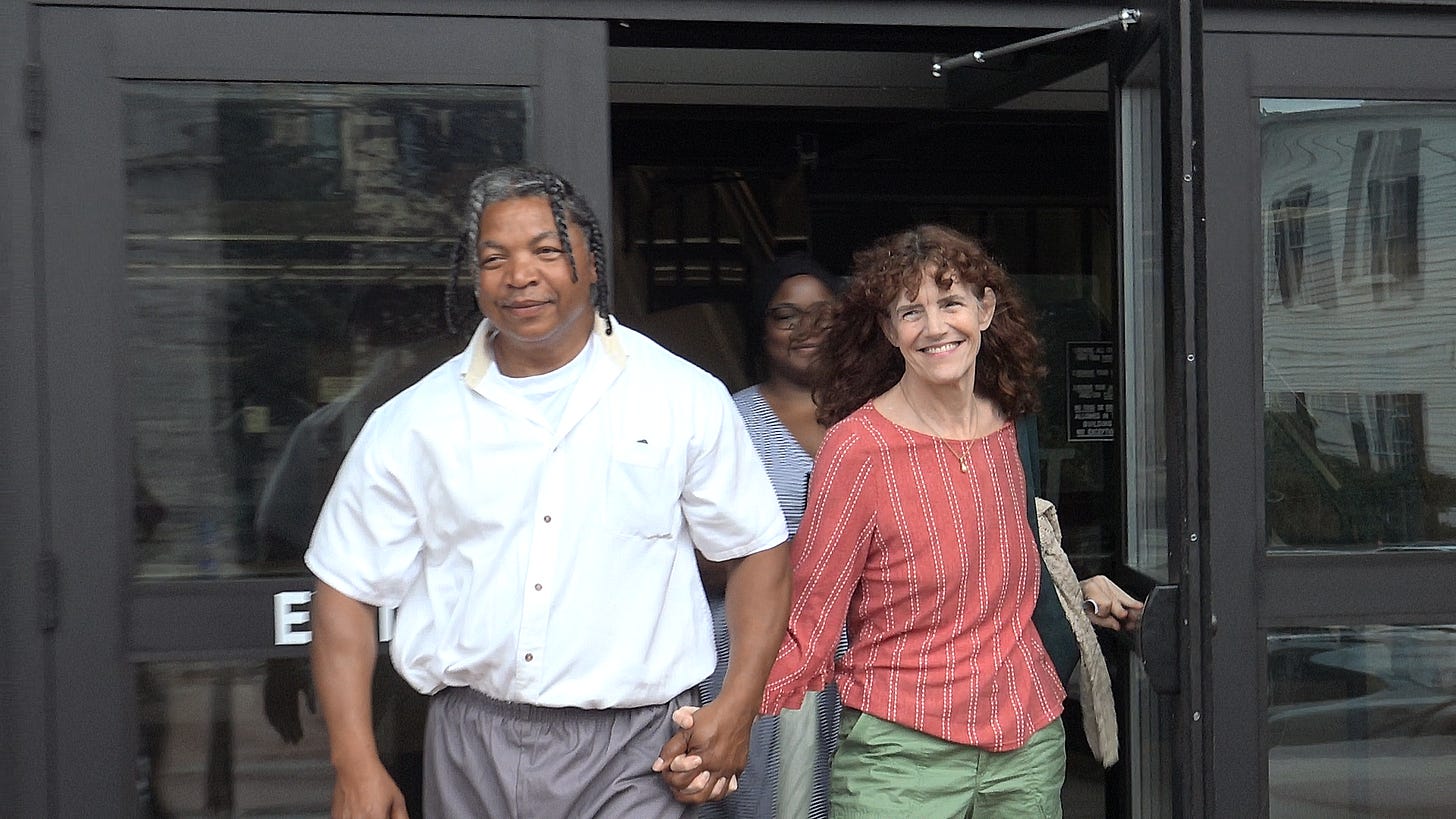
After spending 41 years in prison for a murder he has always said he did not commit, Edward “Eddie” Wright stepped out of the courthouse in Springfield, Massachusetts, at 3:35 PM on July 31. He had a smile on his face, he was holding hands with his wife—and he was finally free.
In 1985, Wright was convicted of stabbing his friend to death and sentenced to life without the possibility of parole. However, Hampden County Superior Court Judge Jeremy Bucci overturned Wright’s first-degree murder conviction in April. According to Bucci’s ruling, prosecutors knowingly and intentionally concealed the fact that a break-in to the crime scene contaminated a key piece of evidence. The judge also determined that a Springfield police detective “knowingly misled the jury” by giving “blatantly false testimony.”
The late Matthew Ryan, who was the Hampden County district attorney in 1985, personally tried the case against Wright. Ryan told jurors that police discovered bloody shoe prints in the victim’s apartment. The prints, he said, were similar to the patterns on the sneakers Wright was wearing when he was arrested in Delaware two days after the murder.
However, Ryan did not provide the defense with a report showing that police only noticed the shoe prints a day or two after someone broke into the apartment through a bathroom window. The person who broke in couldn’t have been Wright because he was in police custody in Delaware at the time. And according to Bucci, police did no follow-up investigation to determine who was responsible.
By the time the crime scene was compromised, police had already spent days examining the apartment for evidence but hadn’t noticed the shoe prints. Bucci said this makes it “reasonable to infer” that the prints weren’t present prior to the break-in. And the prints, according to the judge, were the only forensic evidence that prosecutors used to link Wright to the apartment at the time of the murder.
The shoe-print evidence was collected by Alfred Ingham, the same Springfield detective who responded to a 911 call about the break-in. But when Ingham testified at Wright’s trial, he made no mention of the break-in. The detective also falsely told the jury that, to his knowledge, only police officers had been inside the apartment during the period when they collected evidence.
The Hampden County District Attorney’s Office did not provide Wright with the detective’s report about the break-in until 2021—36 years after the trial.
Ingham, who retired from the police department shortly after Wright was convicted, testified at a hearing in December. He acknowledged that he did not mention the break-in during his trial testimony even though he knew it was significant to the murder investigation and may have contaminated evidence. In an affidavit, he said he couldn’t explain why he didn’t mention it. He also said he believed his trial testimony could have presented “a false picture” to the jury.
At his 1985 trial, Wright testified that he met up with the victim at her workplace, took her home in a car he was borrowing from another friend, spoke with the victim in her apartment, and left during the early morning before she was killed.
Wright’s lawyers have argued that evidence gathered after his conviction points to a now-deceased ex-boyfriend of the victim as a likely culprit of both the murder and the break-in.
Wright, now 63, has spent nearly two thirds of his life in prison as a result of the murder conviction. While incarcerated, he lost his mother and three of his siblings, according to his lawyers. He also met and married his wife, Mimi Olivier. In an interview before Wright’s release, Olivier said the two married in 2009 and that having an incarcerated spouse has been challenging.
“It’s one of the worst experiences that I could ever imagine,” she said. “It’s also, though, a testament to the power of love and the power of my husband. … It’s worth it to go through all of that, to be part of his life, to have him in my life, as awful as it is.”
Wright is currently represented by a team of lawyers, including two from the New England Innocence Project, Stephanie Hartung and Radha Natarajan, the latter of whom is the group’s director. After Wright was released from custody in July, Natarajan addressed a group of reporters outside the entrance to the courthouse.
“[Wright] was wrongfully convicted in this courthouse 40 years ago,” Natarajan said. “He is taking his first steps of freedom after so long. The journey has been long, but it is not even over today.”
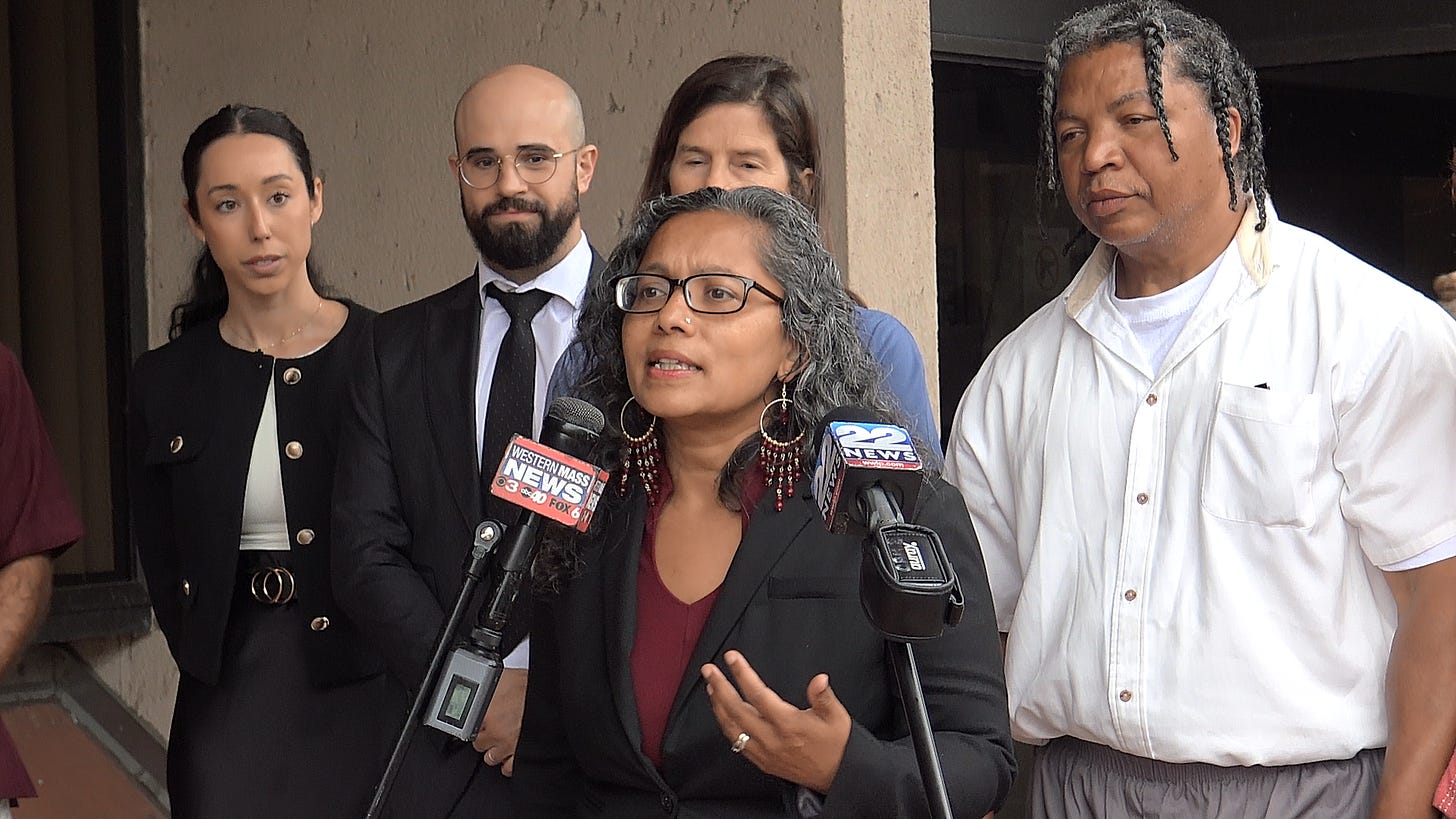
After Bucci’s ruling in April, the Hampden County District Attorney’s Office filed a gatekeeper petition with a single justice of the Massachusetts Supreme Judicial Court, requesting an opportunity to present an appeal to the full court. However, Justice Serge Georges denied the petition in July, upholding the lower court’s decision.
Bucci initially denied Wright bail after a hearing in May. But after the SJC justice rejected the DA’s gatekeeper petition, a different superior court judge agreed to release Wright on personal recognizance.
The district attorney’s office could still try Wright again. However an assistant district attorney said at a hearing in September that the “case is not retriable” and that “allowing a motion for a new trial effectively ends [the] prosecution.”
A spokesperson for Hampden County District Attorney Anthony Gulluni did not respond to a request for comment about whether his office intends to move forward with another trial.
“They have already said that this case is not retriable, and we agree,” Natarajan said. “They could choose today, if they wanted to, to end this case.”
The next hearing in Wright’s case is scheduled for August 22 in Hampden County Superior Court, according to court records.
As Natarajan spoke, Wright and Olivier held hands and smiled at each other. Wright did not speak with the media because, Natarajan said, he is still facing the possibility of another trial.
However, in a written statement, Wright said: “Whether or not the Commonwealth decides to retry my case, all I’ve ever wanted is to see it through so I can finally clear my name and be reunited with my family. I look forward to a jury hearing all the evidence in my case.”
He added: “After 41 years in prison—separated from my family and friends—I can now continue my fight in freedom. My release from prison is the first step in a long journey. I just want to heal and share what’s left of my life with those loved ones who are still alive.”
“Circumstantial and Not Overwhelming”
Wright was convicted of killing his friend Penny Anderson, who was found stabbed to death in her Springfield apartment on May 14, 1984. Police determined that Anderson was last seen alive entering the apartment with Wright around 1 AM, after the two left a nightclub where she worked as a dancer, according to Bucci’s ruling.
Prosecutors have argued that multiple pieces of evidence point to Wright as the killer. At trial, a forensic chemist said that testing revealed the presence of non-visible blood in the car Wright borrowed the night of the murder.
Two days after the murder, police obtained a statement from a man who knew Wright. The man claimed that Wright called him from Delaware the day of the murder and said he killed a white woman in Springfield. According to the witness, Wright said he was lying on the woman’s bed and stabbed her after she pulled a gun on him and fired it. However, several months later, the witness recanted his statement.
Wright’s lawyers have argued in court documents that the alleged confession was not corroborated by physical evidence. Police located Anderson’s body in her living room, not her bedroom. Her wrists were bound, making it unlikely she had fired a gun. And police did not locate a gun or other evidence of a shooting in the apartment.
Wright’s lawyers have also said that the chemist who claimed to have found blood in the car relied on preliminary tests that can produce false positives. The chemist should have performed more precise lab tests to confirm the results, the attorneys said in court documents.
Bucci concluded that the evidence against Wright was “quite strong.” However, the judge wrote, it was “circumstantial and not overwhelming.”
“There was no credible evidence of the defendant having a motive to kill the victim,” Bucci wrote. “Nor was there any forensic evidence that the defendant was at the victim’s apartment during or after the murder, except for the significant, and now believed to be highly unreliable, shoe print evidence repeatedly highlighted by the prosecutor at trial.”
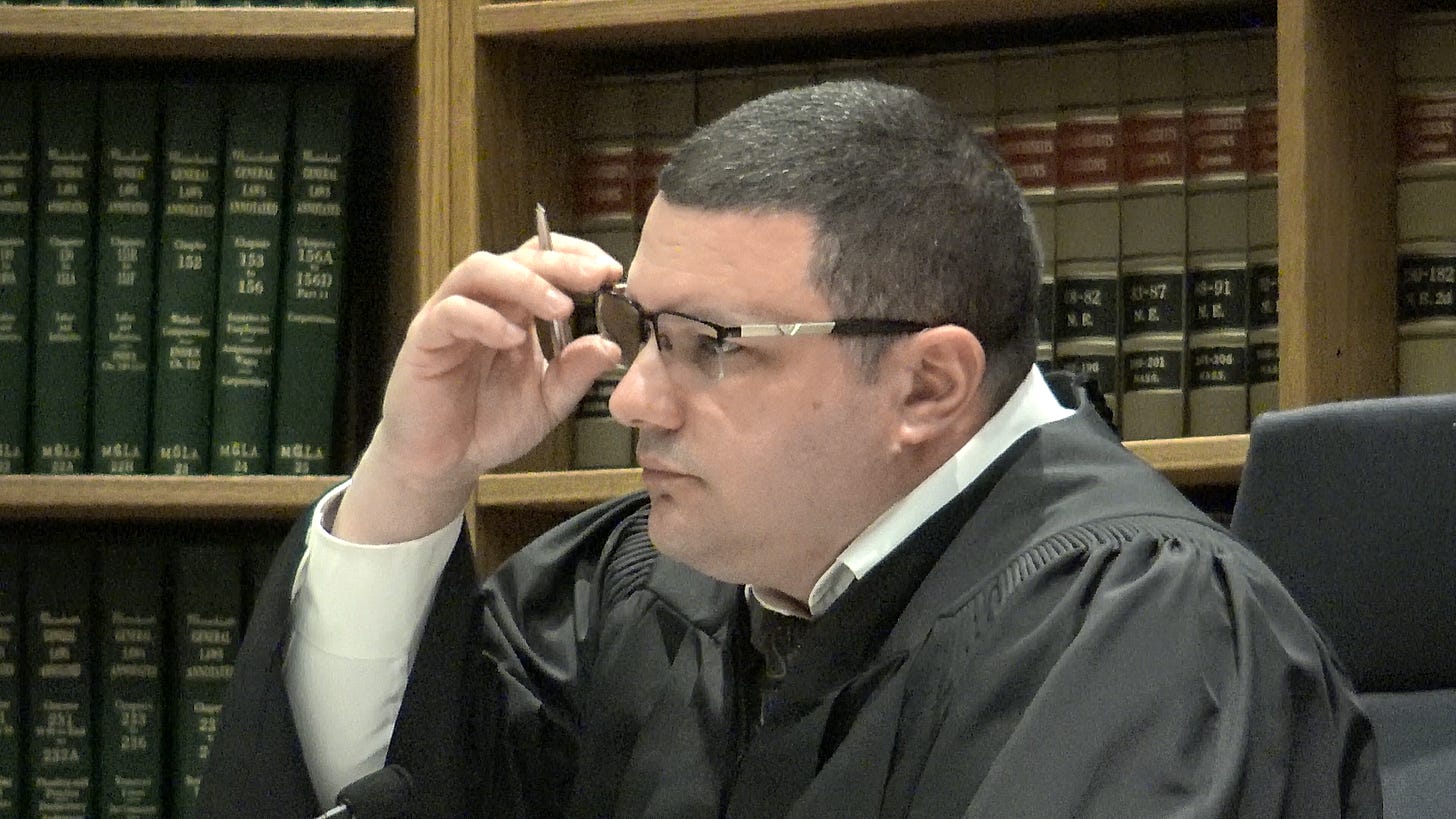
Wright’s lawyers have argued that police failed to adequately investigate a man who may have committed both the murder and the subsequent break-in. That man, Allen Smalls, an ex-boyfriend of Anderson, was questioned by police during their investigation.
According to court records, Smalls admitted to police that he threatened Anderson and told her he was going to show up at her apartment as she was leaving the nightclub shortly before the murder. However, Smalls told police that he went home after leaving the club.
During Wright’s four decades in prison, he filed five other unsuccessful motions to overturn his conviction and presented additional evidence related to Smalls.
In 2007, an ex-girlfriend of Smalls testified that he confessed to the murder after Wright was convicted. According to the woman, Smalls assaulted her, threatened to kill her like he had killed Anderson, and told her not to tell anyone what he said. The woman also said Smalls continued to display nude photos of Anderson in his bedroom after the two had broken up and said he didn’t want anyone else to “have” her.
According to testimony Smalls’ mother gave in 1986, he admitted to telling the ex-girlfriend he murdered Anderson but said he only did so to scare her. The mother also said that Smalls brought home items a few days after the murder and claimed he had taken them from the victim’s apartment after breaking in through a window.
In 1986, Smalls’ sister also testified that he tried to sell her boyfriend a hunting knife around the day of the murder. Years later, Wright obtained forensic testing that showed the knife had blood on it, but the testing was otherwise inconclusive.
Smalls died in 2021, according to court records.
When Wright’s convictions were overturned in April, Gulluni, the district attorney, issued a statement pointing to the previous unsuccessful attempts. Gulluni said that Bucci had overturned Wright’s conviction “based largely on the same arguments that have been examined and rejected by courts with appropriate appellate jurisdiction.”
He added: “We stand by the integrity of the original prosecution.”
“That is a shocking statement,” Natarajan said at the time. “If this is integrity, then there are many more convictions out of Hampden County that need to be reviewed.”
Natarajan said that it’s very common for it to take multiple attempts to overturn a wrongful conviction.
“Part of why it took Mr. Wright so long—and he might not have been wrongfully convicted at all—is because of the evidence that was hidden from him,” she said. “The district attorney’s office dismisses this latest attempt as if it is the same as all the other times [Wright] has insisted correctly that he is innocent. And the reality of it is that the judge, in overturning the conviction, only considered new evidence.”
“He’s Very Easy to Love”
After Wright left the courthouse in July, he and his supporters headed to Classic Burgers in West Springfield. Wright ordered a cheeseburger and vanilla milkshake for his first meal as a free man.
“We had a great time together, and Eddie even got to have his first dance with his wife,” Natarajan said.
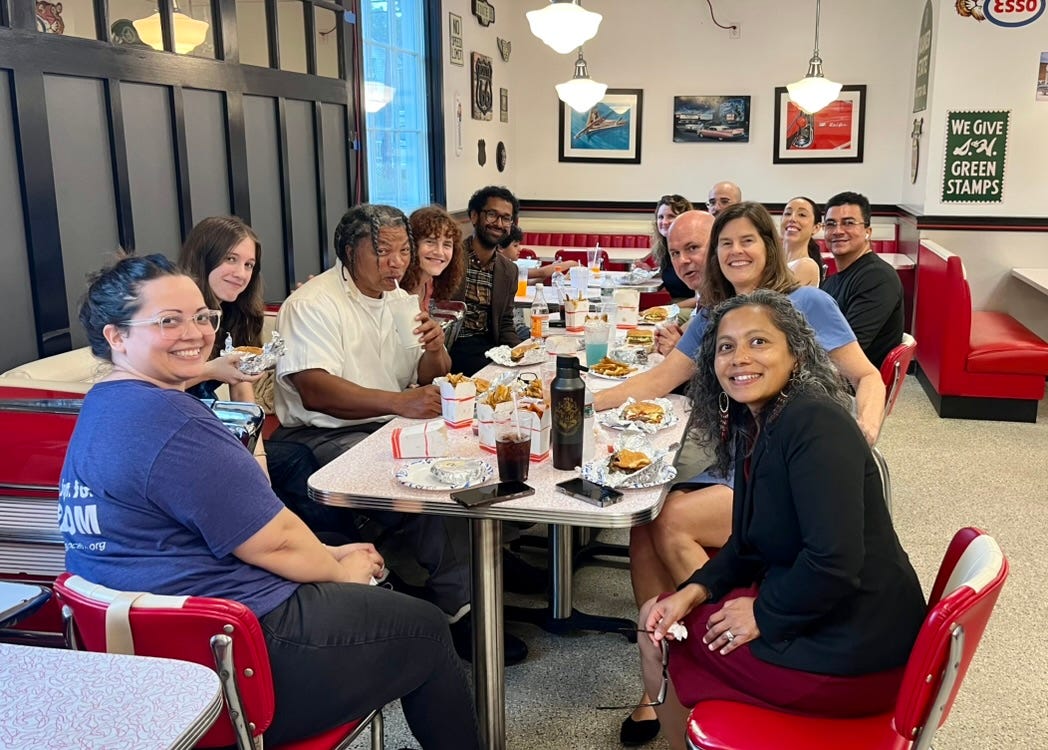
Wright now lives with his wife, Olivier, at her home. Olivier said she first met Wright in 2007 when she was visiting an incarcerated friend. Olivier’s friend knew Wright and told her about his story, including his efforts to overturn his conviction. Soon, she and Wright started speaking on the phone. Two years later, they got married.
“He’s very easy to love, so I fell in love with him very quickly.” she said. “The way he tells the story, it was love at first sight. He says that the minute he saw me, he knew who I was. But I was a slowpoke. It took me a little bit longer.”
Asked what drew her to him, she said, “His immense positivity under such awful conditions for so many years, and … his resilience and his refusal to give up in his quest for justice.”
When Wright’s conviction was overturned in April, Olivier said she hoped it would inspire people.
“I think a lot of people are so discouraged,” she said. “It’s such a negative time to stand up for justice and freedom and what’s right in this country. And I think that for myself and for everyone who hears about this, it’s such a positive force to remember and understand that sometimes justice and freedom do win out.”
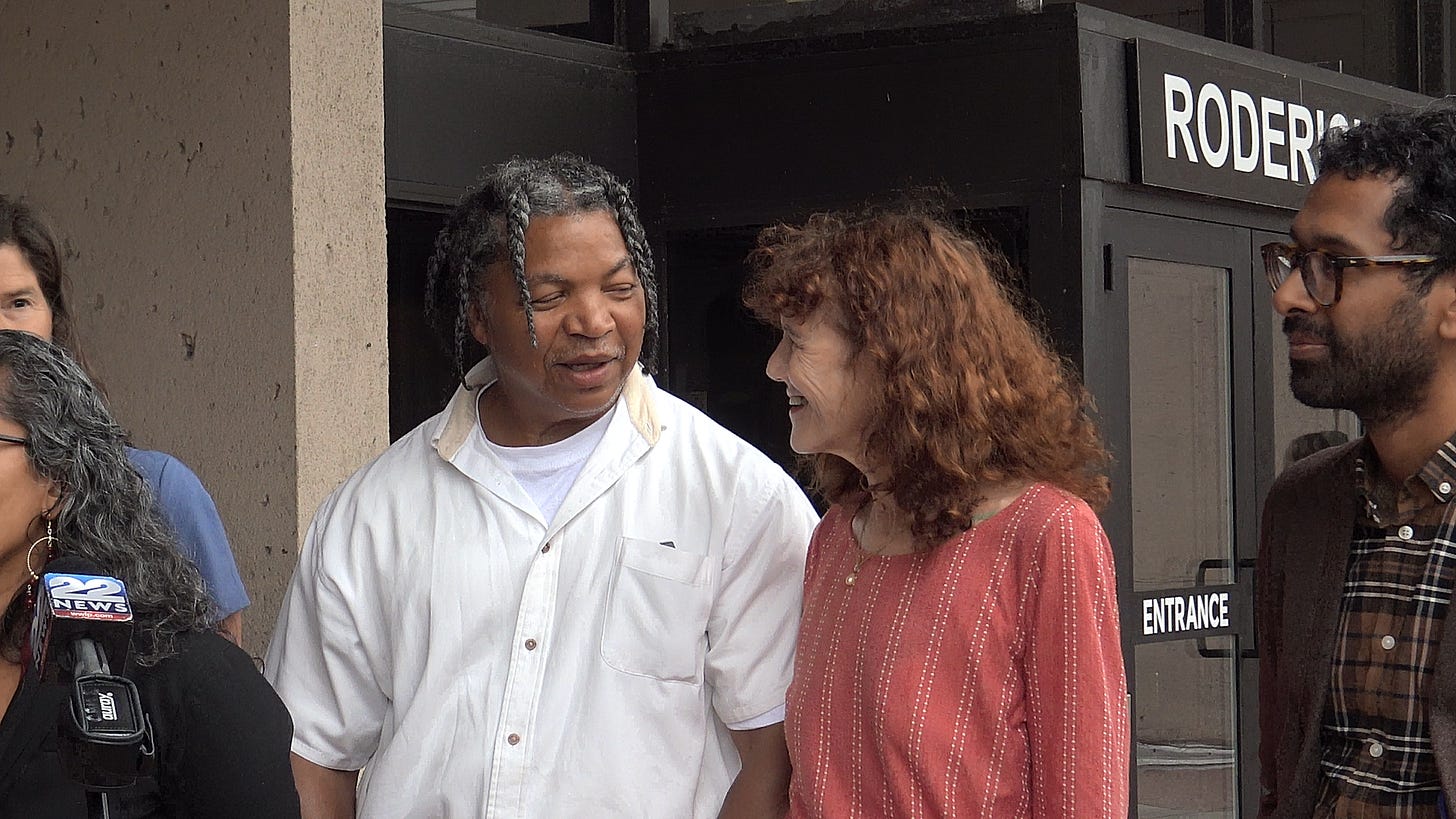
Two men, Jabir Pope and Albert Brown, said they knew Wright in prison before their own murder convictions were overturned in 2021 and 2022 respectively. They both described Wright as a generous man.
“He lived in the law library,” Brown said. “He was helping working on his case, but he was helping you work on yours. … He helped anybody and everybody that needed help legally. And not just that. If you was hungry or something, he’d feed you.”
Pope said he worked as a clerk in the law library and spent “a lot of time comparing notes” with Wright.
“There were a lot of parallels in our case, in terms of the powers that be hiding evidence from us,” Pope said. “And discovering that evidence is what freed us.”
Pope said that when he experienced tragedies—he lost two sisters to COVID and his mother died on Mother’s Day—he relied on Wright for emotional support.
“It’s people like Eddie that I could walk the yard with and lean on,” Pope said. “And he could lean on me during his time of loss.”
Hartung, one of the New England Innocence Project attorneys, described Wright as “enormously intelligent and kind and creative.”
“He remembers my birthday, he remembers when my son is graduating from college,” she said. “He sends cards. He reaches out to check on me about things. He’s just an incredibly thoughtful person when he has so much in his own life … to take up his energy and effort.”
Hartung said Wright now lives about two miles away from her and she’s “looking forward to having him as a neighbor.”
“He’s been enjoying some good meals after so many years of prison food and he’s spending a lot of time catching up with family and friends,” she said. “He has learned how to use FaceTime and loves being able to see who he’s talking to over the phone.”
Most of Wright’s family lives in Delaware, Hartung said, and he’s currently unable to travel there because he is prohibited from leaving Massachusetts. His family members were unable to attend his release because he only had a few hours notice. However, they plan to visit.
Hartung said that one of the first things Wright wanted to do after he was released was go fishing.
“He lives close to a good fishing spot and he already caught his first fish,” Hartung said. “Even though it was small and he had to throw it back, he was thrilled.”
She added: “Everything is still so new and he is undergoing a seismic adjustment, like so many people do after the trauma of long-term incarceration. But more than anything Eddie is thrilled and relieved that the truth has come out in his case and that he is finally free. He is rebuilding his life in freedom one day at a time.”
Thanks for reading! If you haven’t seen it yet, please check out my reporting about James Carver, who spent 36 years in prison until a judge overturned his arson and murder convictions.
As always, if you’d like to keep The Mass Dump running, please consider offering your financial support, either by signing up for a paid subscription to this newsletter below, becoming a Patreon supporter, or sending a tip via PayPal or Venmo. It takes a tremendous amount of work to bring you stories like this, and I rely on your support to keep doing it. A monthly subscription is just $5!
Even if you can’t afford a paid sub, please sign up for a free one to get updates about this story, and please share this article on social media.
You can follow me on Bluesky and Mastodon. You can email me at aquemere0@gmail.com.
That’s all for now.


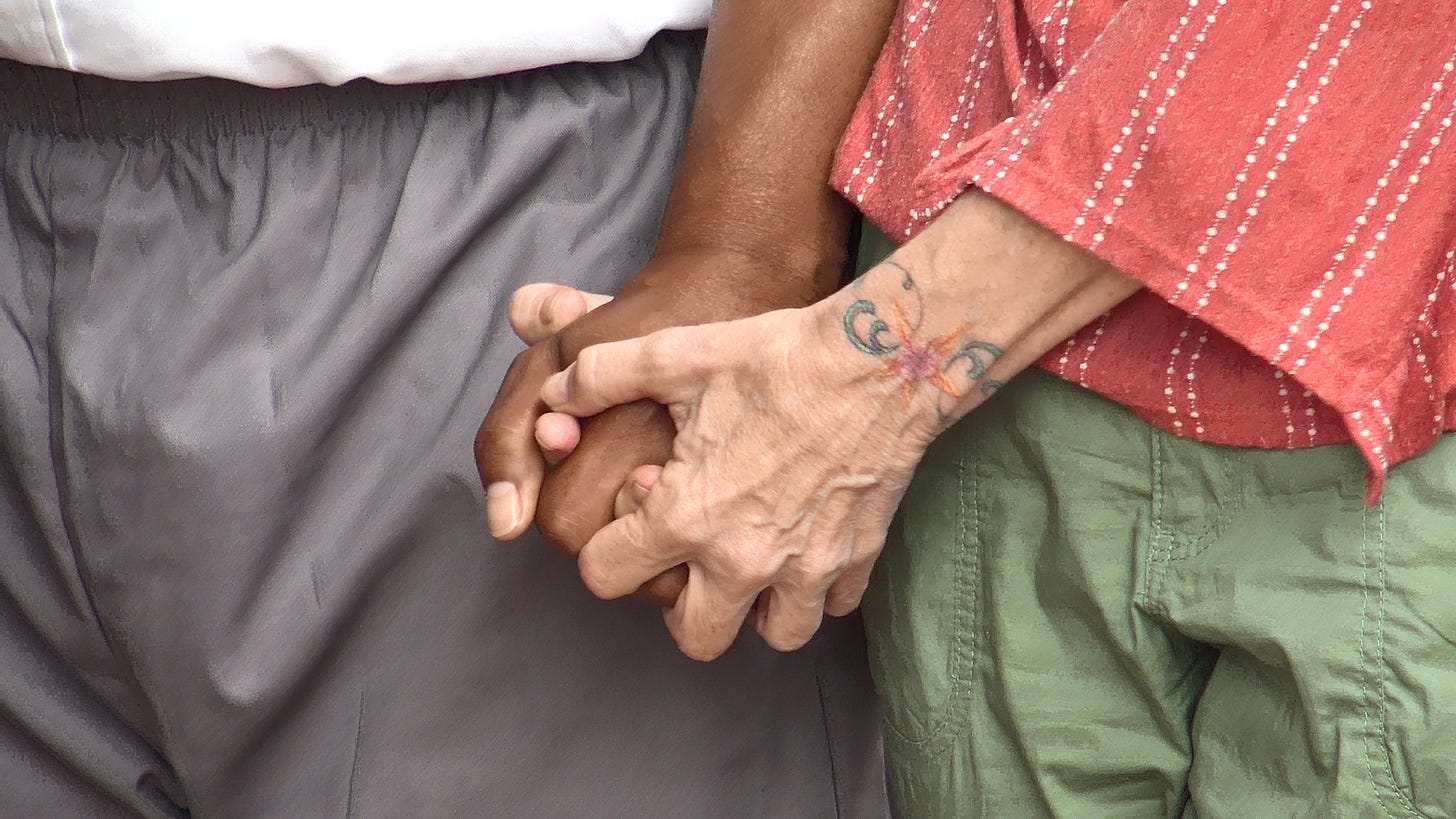
So good to know that Mr. Wright is finally on the Outside! Thank you for your powerful reporting, Andrew Quemere. We remember Edward from the old Mass Prison Voice newsletter. Andrew, if you happen to speak with him again please convey best wishes to him and his wife. Jabir Pope and Shorty 'Mac' Brown, too! It is extraordinary that long-term prisoners are able to hold tight to their humanity & compassion despite unending petty deprivation and violence by the state (small s), but they do. Thank you again, Susan Mortimer
Being convicted of crime you didn't commit then serving 40years of your life in prison tf! The detective and all those involved in Mr.Wrights prosecution submitting/ withholding evidence and/or false testimony should be held accountable. Blessings to all his lawyers, supporters and to you Andrew. Your reporting is thorough and informative. I go through every emotion when reading your pieces. Thank you so much for shinning the light on these lives.